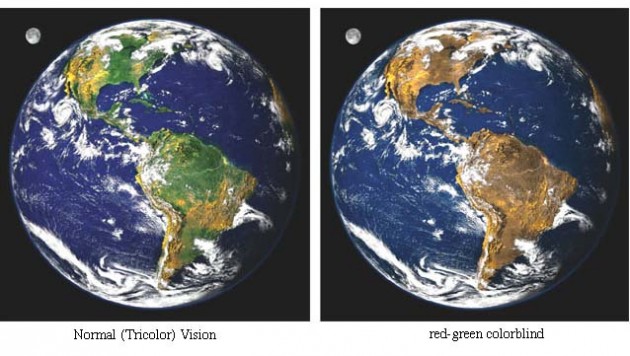Unless you have trained yourself to think otherwise, it is a common mistake to assume that everyone sees and experiences the world the same way you do. They don’t. There are significant implications for education, social harmony, and communication when we fail to recognize the basic truism that all external stimuli must be filtered through our individual senses, which are influenced by past events and our genetic code.
We See Colors Differently
Red-Green color blindness is found in 8% of white males. That is 1 out of every 12.5 Caucasian men. Walk through the grocery store, the street, the library, or your office and think about that. Every 12th or 13th white guy you pass sees the world like this:

For 1 out of every 12.5 white men, the two images look exactly the same. If you tried to describe the richness of color, the beauty of the shades of green, for the image on the left, you are talking in a language they literally lack the experience to understand. To them, these two pictures are identical.
If you were trying to pick paint colors or debate a work of art with a white man, few people would stop to run through the mental checklist to consider the possibility that you, quite literally, aren’t seeing the same thing.
In my case, I score a perfect (100%) on color shade tests, which probably explains my family’s successful history in the embroidery industry where a minute grade variation in dye lot hue for the same color could mean a refused order for a customer. That was real money out of our pocket. Had we not had that genetic ability, we might not have been able to stay in business. Factors like that matter.
We See Image Resolution Differently

Before the advent of modern optometry, we each would have seen the world very differently.
Each of us has different eyesight levels. In my case, I cannot see the giant “E” on the top of an eye chart. It’s been that way since childhood. Had I been born before corrective eyewear and contact lenses, my life experience would have been very different. While my contemporaries woud have been able to spot a deer for food or a piece of parchment across a room, I would have been functionally blind. My occupation choices would have been severely limited before the age of technologically-enabled accessibility. Someone who hasn’t had bad eyesight cannot truly comprehend what the world looks like without the miracle of modern optometry.
Before widespread vision testing, a father who grew angry or frustrated his son couldn’t catch a ball was playing a losing game.
We Taste Differently
Anyone who reads the site knows that my household is made up of people with palates so sensitive that we spent 10 years perfecting a Cinnabon recipe. We spent tens of thousands of dollars on coffee machines, coffee blends, and coffee supplies until finally having a restaurant grade Douwe Egberts machine installed so the consistency remains absolutely perfect from cup to cup. My grandmother can do a blind taste test and tell you whether something is sweetened with corn syrup, granulated sugar, or powdered sugar. That is normal, elementary school level stuff to us (and to a lot of other foodies). Yet, because of genes or environment (e.g., smoking), some people lack this ability.
Sometimes, it seems like the universe has a way of providing exactly what you need at the moment you need it. As I wrote this article, a message landed in the site inbox last night on this exact topic, regarding my discussion of Mexican Coke versus American Coke. The author, from Austin, Texas, arrived at the site after searching for something along the lines of “Can you really taste a difference between American Coca-Cola and Mexican Coca-Cola?”. Approximately 44 seconds after reading the article, he sent me this message:
You kinda seem like a tool. I doubt very much you can tell the difference between mexican coke and american coke. I promise you you can’t.
You can tell from his Internet search history and behavior, he arrived at the site because people were telling him there was a difference and he can’t perceive one. Due to confirmation bias, he wants to believe that is the case for everyone, just as a color blind person cannot experience the same thing most people do when they look at a painting, box of crayons, or the fruit and vegetable stand in the local produce department.

I prefer Mexican Coca-Cola’s sugar base due to the lighter aftertaste. There are people who can’t tell the difference. In fact, there are people with taste buds so bad they can’t tell a difference between Coke and Pepsi!
It is highly probable that this man truly, honestly believes everyone who talks about the taste difference is out of their minds. He even “promises” us that we can’t tell a difference, sort of like a color blind person promising someone who has full color spectrum promising there is no difference in the image at the top of the page. He doesn’t have the ability to tell otherwise, which is why it shouldn’t be held against him. That is why responding to his message won’t do any good. (I doubt he’ll come back to the site – he’s clearly going around the Internet looking for this exact topic and arguing with people who say they can tell the difference between corn syrup and sugar.)
For more examples, just look at the blind taste test Chef Gordon Ramsey forces contestants on “Hell’s Kitchen” to undergo. Some chefs cannot tell the difference between beef and chicken! It’s the most astounding thing I’ve ever seen. Common sense should tell them they probably shouldn’t be in the industry. (There are a few exceptions. Ben & Jerry’s ice cream, for example, had more flavoring because one of the founders, they later found out, couldn’t taste as well as most people, resulting in an overabundance of extra cookie dough, chocolate, sugar, etc.)
In fact, scientists have discovered the genetic presence of so-called super tasters. These people have palates so sensitive that a lot of foods are horrible, so they don’t eat much. Since many poisons are bitter, this was an evolutionary adaptation that would have allowed them to be more sensitive to a dangerous plant when brought back to the village. If someone in your family is a picky eater, it probably isn’t their fault. Don’t bother arguing with them. They aren’t experiencing the world in the same way you are.
We Smell Differently
Again, how we smell depends in part on genes and in part on environment (once again, smoking would have an influence here). My own personal experience is interesting because, if you can’t tell from my fragrance obsession a la Creed, Bond No. 9, Amouage, etc., I can take a scent and tell you many of the ingredients after a single smell or two (which is probably related to my taste ability).
[mainbodyad]However, I can’t smell skunk. This is known as a specific anosmia. I lack the genetic protein necessary to tell my brain to communicate how to “signal” how to perceive the scent. I can tell the air gets heavy, but it isn’t in my genome. Getting technical again, the “rare anosmia to the n-butyl mercaptan of skunk, and more commonly the scent of freesia flowers, may be inherited as autosomal recessive traits.” In my case, I can still smell freesia and everything else so there is no real world implications other than I don’t know what it is like to walk through a forest and be overwhelmed by the famous scent with which everyone else seems familiar.
A lot of people aren’t that lucky. There are people with total anosmia who lack the ability to smell. This can radically transform the quality of their social life. Everyone who went to college knows the otherwise nice guy who doesn’t seem to realize he has horrible body odor or the girl who has terrible smelling shoes who doesn’t seem to realize they are peeling the paint off the walls. No matter how great these people might be, no one wants to be around them.
We Hear Differently
Some people are tone deaf. Some people have perfect pitch. Young people can hear certain high-pitched tones that aren’t audible to older people. The same office or classroom can be radically different to two people based on a hum of a light fixture or the whirling of a computer fan.
We Interpret Non-Verbal Communication Differently
Ask someone who parents a child with severe Autism how well their kid can interpret nuance of facial expression. Even with perfect eyesight, someone who falls to a far extreme on the Autism spectrum scale would experience a conversation wildly different than a “normal” person would, especially if there were heavy elements of sarcasm or sardonicism.
Conclusion
The point of all of this is the always remember to account for perception differences, which are very real, when having a discussion with someone. It is entirely possible they (or you) think you are absolutely correct because your genetic material, combined with lifestyle factors, are allowing you to pick up on more or less stimuli.
Before you insist someone else is wrong in a business arrangement or personal relationship, before you conclude that they don’t have a valid point, always run a filter asking, “Is is possible we are experiencing the same inputs differently?”. It’s an incredibly useful tool. Take advantage of it.
[mainbodyad]


